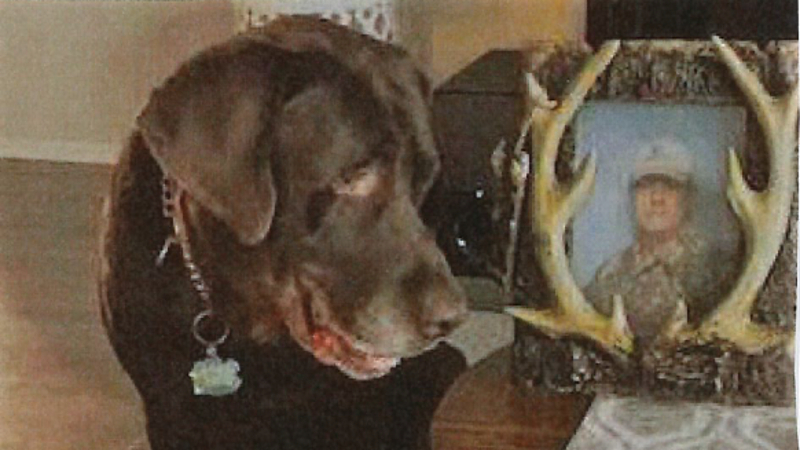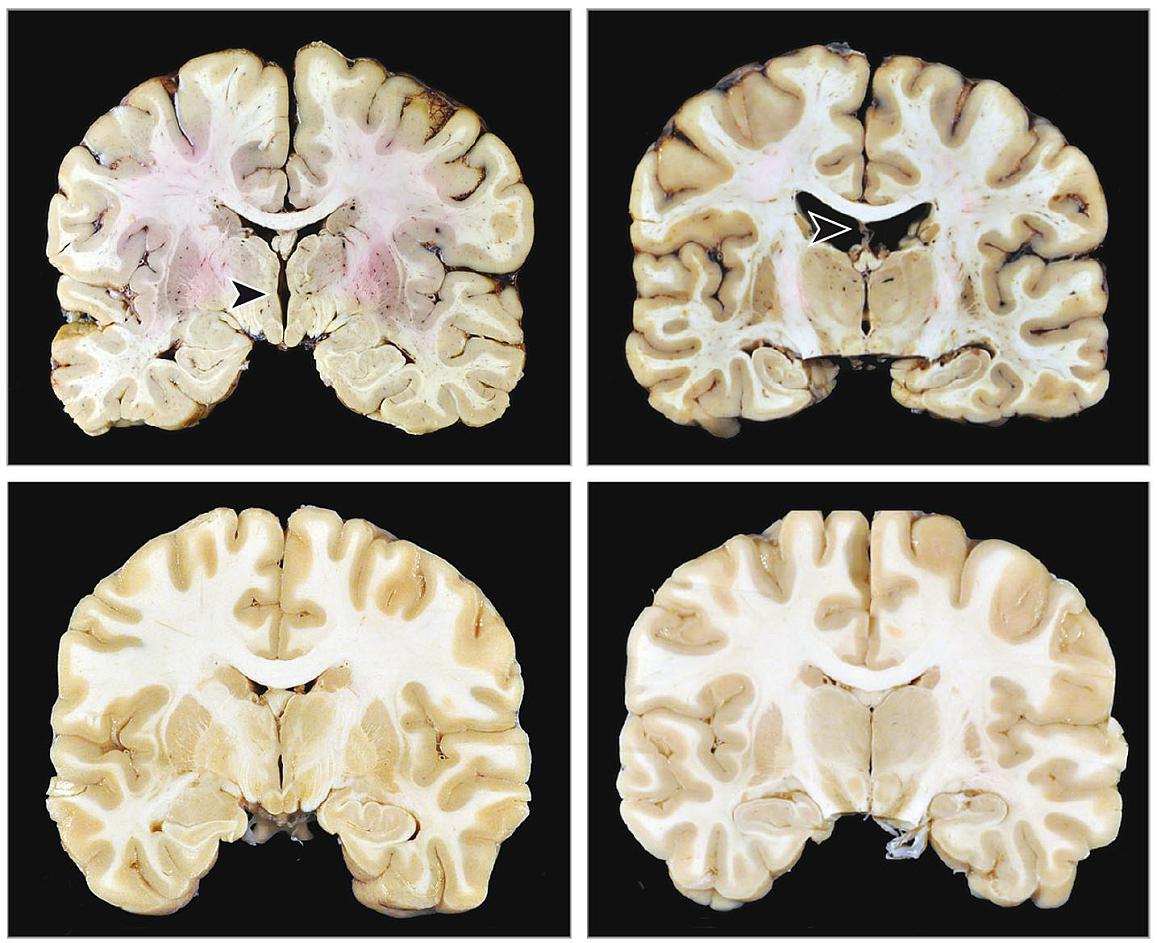Keith Pinkham served in the Vietnam war and battled severe PTSD upon return to civilian life. By 2013, he began having memory problems alongside severe respiratory issues. His breathing problems worsened and led to his death in April 2016. His widow Alice Pinkham agreed to donate his brain to the UNITE Brain Bank for Chronic Traumatic Encephalopathy (CTE) research. Researchers determined Keith did not suffer from CTE but did have early signs of dementia. Alice wrote Keith’s story to share his Legacy as a kind, ambitious man, a Vietnam Veteran, and a loving husband.
Keith was born in Cleveland, OH on February 23, 1951 to Frank and Frances Pinkham and was the eldest of six kids. Keith always liked the outdoors and it was evident growing up. While in school he had trouble concentrating in class due to always staring out the window looking at the birds, squirrels or anything that had to do with nature. He learned how to hunt and fish with his father and grandfather. His younger brother Kevin was his favorite hunting and fishing buddy.
Keith Pinkham was kind, funny and an avid outdoorsman who loved to hunt, fish, and garden; he was smart and a jack of all trades. Keith could hold a conversation with people from all walks of life and fix just about anything, if he didn’t know how he would figure it out even if it took him all day.
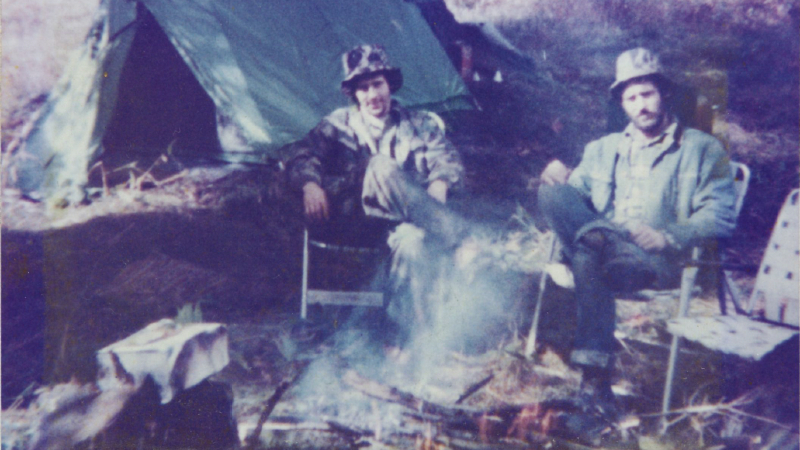
Keith enlisted in the U.S. Army after graduating from high school in 1969. After completing basic training, he was deployed to Vietnam. His duty was to detect land mines and spray Agent Orange to clear the fields for the troops. One story he would tell was the time he stepped on a land mine; however, it didn’t detonate because it was not positioned in place correctly for it to go off. Upon his return from Vietnam, much like other Veterans, he had trouble adjusting to normal life. Back then there was no such thing as PTSD and Vietnam Veterans did not receive warm welcomes upon their return. He struggled with substance abuse and the demons that can come with being a war Veteran. Keith married, had two daughters, Krista and Julie, and divorced.
I meet Keith in Denver, CO in 1982 and we were married in 1983. I was a flight attendant at the time and lived in the apartment across from his brother Kevin. To this day I still can remember the first time I laid eyes on him. We both fondly remembered that day. He could recall what I was wearing and what I was doing. Keith came knocking on my door a couple weeks later.
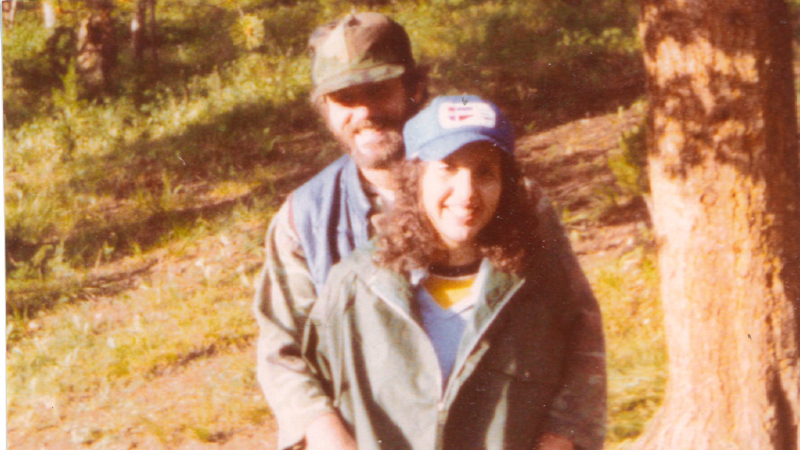
Keith experienced a lot of trauma in his life, including the death of his brother Kevin in 1982 shortly after we met. Kevin was working overnight at the shop he managed. He had an accident and fell and hit his head. Keith found him the next morning when he went to relieve him. The paramedics did all they could, but it was already too late. Keith was devastated. Kevin was not only his brother but also his best friend. Keith struggled with night terrors about finding his brother and memories of Vietnam. Eventually, he overcame the loss. In 1998 his mother passed away after being diagnosed with stomach cancer just six months earlier. Her death was so sudden and was another big blow to Keith. She was the glue that held the family together. Despite these losses Keith persevered and went on to become an accomplished auto body repairman and painter, a trade he learned from his father.
In May of 1991, we moved to Austin, TX where Keith continued in the auto repair field eventually working his way up to manager of a successful local auto body repair shop. Being in this field throughout his adult life he started getting restless and looking for a change. He was offered a job working for a south Texas hunting outfitter and gladly accepted. You name it, Keith did it. He served as a hunting guide, cook, and learned everything he could about the business because his dream was to start his own outfitting service.
Keith did this for a couple of years before starting his own business “Old Buck Outfitters.” He thought the name was appropriate, an old coot starting his own business. He worked hard to get Old Buck Outfitters started, he would drive all over southern Texas to scout out properties he could lease for hunts until he found 500 acres with a ranch house in Sabinal, TX. Keith started advertising everywhere he could, and the business started growing, booking deer, hog, and dove hunts during season. I always teased him that it must be nice that his job is his “hobby.” Keith couldn’t have been happier, and I was delighted that he was finally doing something he thoroughly enjoyed and woke up every day feeling he had a purpose.
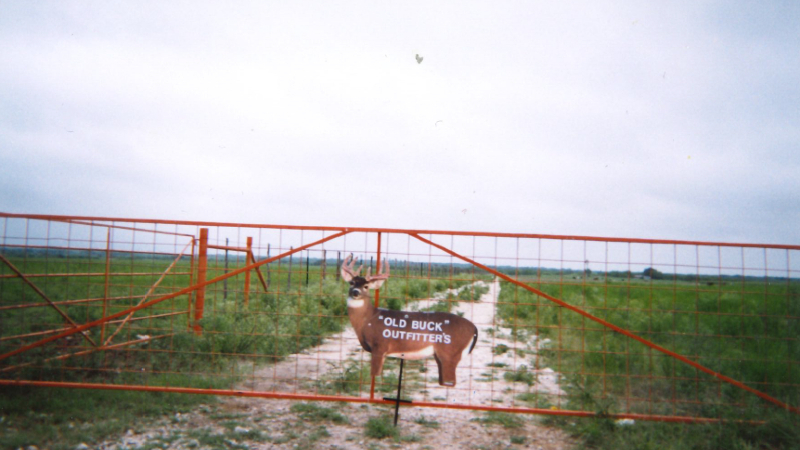
During the energy crisis in 2004-2005, gas prices rose and less people were booking hunts, but Keith still tried to keep the business going. Then as fate would have it, he was diagnosed with prostate cancer in late 2006. The cancer was serious but contained and hadn’t spread. With treatment, doctors gave Keith a good prognosis. Keith endured eight weeks of radiation therapy every day, followed by the implanting of 80 radioactive seeds.
In the middle of the radiation therapy Keith’s personality began to change; he became angry and distant, he started having nightmares of his mother and brother, and started drinking heavily. I assumed it was due to the diagnoses, treatments, and the business not doing well. I suggested therapy, however he declined. After months of pushing me away, Keith came to the realization that he needed help in dealing with his issues and realized he had to shut the business down. I found a psychologist that specialized in PTSD and couples and family counseling. Dr. Albanese ended up being a blessing. Keith was reluctant at first but started to open up about his feelings, night terrors, and experiences in Vietnam. Keith was suffering from PTSD and had a nervous breakdown. Dr. Albanese explained how traumatic life events can cause a person to start reliving situations they hoped to have forgotten.
Mentally, Keith started making good progress by seeing Dr. Albanese regularly. Unfortunately, months later he started having trouble breathing. After having numerous tests done, he was diagnosed with COPD and was prescribed medication to assist in breathing. Shortly after he developed jaundice followed by a diagnoses of Stage 3 cirrhosis of the liver; which led to ascites and constant outpatient visits to the hospital. After treatments and medication, things seemed to be under control when he developed radiation cystitis from the prostate cancer treatments. Keith ended up needing three blood transfusions due to blood loss and was in the ICU for a week. Because of the seriousness of the cystitis, his urologist suggested Keith get hyperbaric oxygen therapy to heal the wound from the radiation and help prevent a recurrence. He received oxygen therapy Monday through Friday for 40 days. Once again, his health started to stabilize and looked like he had made it through another health scare.
He wasn’t able to work due to the COPD but was still able to get around on his own and decided to get a companion to keep him company at home. In 2011, we adopted a beautiful, spunky chocolate lab puppy he named Hondo. Keith’s plan was to train Hondo to retrieve birds so he could take him hunting.
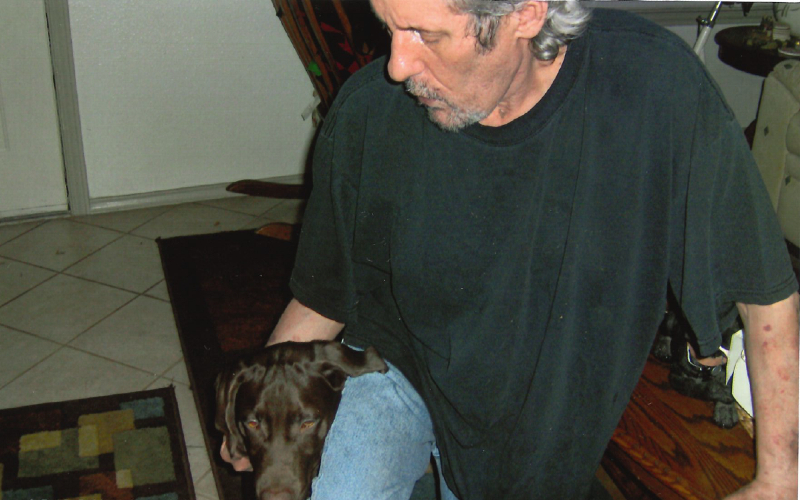
Unfortunately, in 2012 Keith started having a harder time breathing. We tried changing medications and increasing his dosages but he still struggled. He was placed on oxygen 24/7 and had to carry a tank everywhere he went. A year later the prostate cancer returned, however due to the COPD, a biopsy or surgery was not an option. Doctors were afraid to put him under sedation, so he was treated with hormone therapy. All they could do was attempt to slow it down and keep it from spreading. Keith received this treatment every six months, however in 2013 he was diagnosed with Stage 4 COPD and advanced cirrhosis of the liver.
As Keith’s health slowly worsened, ironically Hondo was growing into a strong, healthy dog. Hondo was a great companion and loved and looked after Keith. If he felt he was coughing too long, he would run around the house to find me and barked until I followed him to check on Keith. He would stare at Keith while he slept; at times he would yelp two or three times to wake him. Once he was sure he was awake and okay, he would go lay down. Hondo rarely left his side.
By the end of 2013, Keith had been in and out of the hospital. He had breathing issues, a collapsed lung, and head injuries from falling. He was also having trouble remembering things. At times he seemed confused, he could remember things clearly from the past but wasn’t sure what he did in the morning or would take his medication twice forgetting what time of day it was. I attributed this to his lack of oxygen and the encephalopathy from the cirrhosis, which his doctors said could happen.
Keith was still seeing the psychologist. His dreams and night terrors seemed to subside, and he would practice the exercises she suggested to deal with them. He hadn’t talked much about his time in Vietnam except for a story now and then but Keith started sharing the stories he kept to himself with Dr. Albanese. Talking about his experiences seemed to help, especially when he started sharing them with me after his sessions. It pained me to know what he and other Veterans went through. I never judged him and just said I loved him. I could see how these memories had affected his life throughout the years.
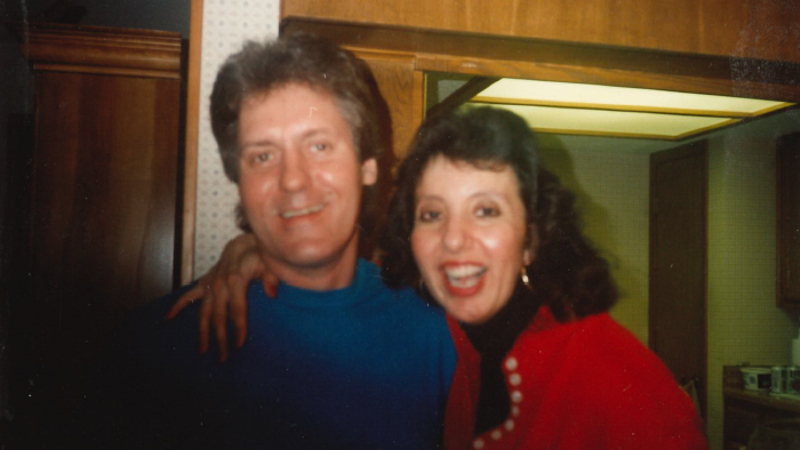
By now the only times Keith left the house were for doctor’s appointments or for medical tests. The last two years for his life were very hard on Keith. He had come to the realization that he was never going to be able to do the things he had enjoyed all his life. One Sunday morning in April, 2016 he started having trouble breathing and looked gray in color. I rushed him to the ER, they immediately tried to stabilize him however nothing worked, there was no option but to intubate him to help his breathing. After careful monitoring he seemed to be stable, they removed the tubes and he was breathing on his own with the help of oxygen. Over the next few days, Keith had to be intubated three times, with the third time briefly stopping his heart. Nothing helped Keith breathe on his own. Doctors said there were only two options; do a tracheotomy and insert a tube to help him breathe, however there was the risk of infection since it’s an open wound and he would need 24-hour care in a nursing home with no guarantee this would even work. The other option was to make him as comfortable as possible and let him go peacefully.
Even though Keith never wanted to be kept alive by artificial means and had an Advance Medical Directive, it was up to me to honor it and make the hardest decision I’ve ever had to make in my life. For the last few years Keith hadn’t had much of a life or anything to look forward to. It was time to set him free. On April 21, 2016 at 5:30 p.m. he took his last breath and died peacefully with me holding him. He was only 65 years young; that year we would have been married 33 years. I struggled with this decision for months.
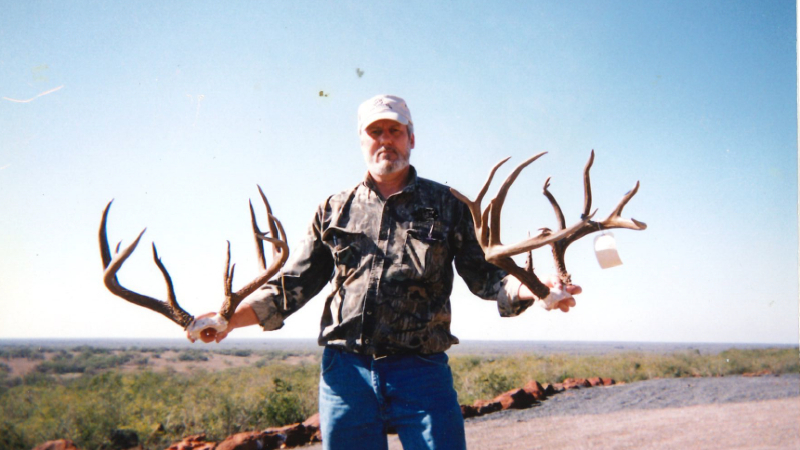
I was asked if I wanted to donate Keith’s corneas upon his passing, however with his medical issues he was not a potential donor. I asked the representative of the cornea bank if he knew of any other organization that I could donate his lungs or liver especially for medical research to help others. He called back to inform me about the research that Boston University was doing for traumatic brain injuries. Being a football fan I had heard about this, but Keith never played football. He said they were doing research on combat Veterans to see if there is any correlation to CTE. If I was interested, he could get the paperwork emailed to me immediately as it needed to be done quickly. I agreed not only because of the importance of this research but it could provide me with some answers on Keith’s behaviors over the last nine or so years.
I received the call from Lisa McHale, CLF’s Director of Legacy Family Relations, to explain the interview process, how long it would take, her role and history of how she became involved in this research I knew I had made the right decision. Lisa was so very kind and compassionate. In December of 2016, I received the final diagnosis. Keith did not have CTE, however he did have age-related tauopathy with severe frontal and temporal lobe atrophy and the early stages of dementia. I had struggled with the decision to stop all treatments for Keith but this research allowed me to have closure and realize I made the best decision for him. It explained so much of his behaviors.
I’m so grateful for the research the Boston University CTE Center is conducting and I thank all the doctors who I spoke to as well as the ones behind the scenes. I cannot thank Lisa McHale enough. Her guidance though this process was incredible and appreciated.
I was blessed to have Keith in my life for many years, he introduced me to the outdoors and experiences I would not have had if it weren’t for him. My years as a flight attendant allowed us to travel and see new places. I was glad to have been able to give Keith this opportunity he might not have had otherwise. When Keith passed away I not only lost my husband but also my soul mate and best friend. When he took his last breath, Keith took my heart with him.
